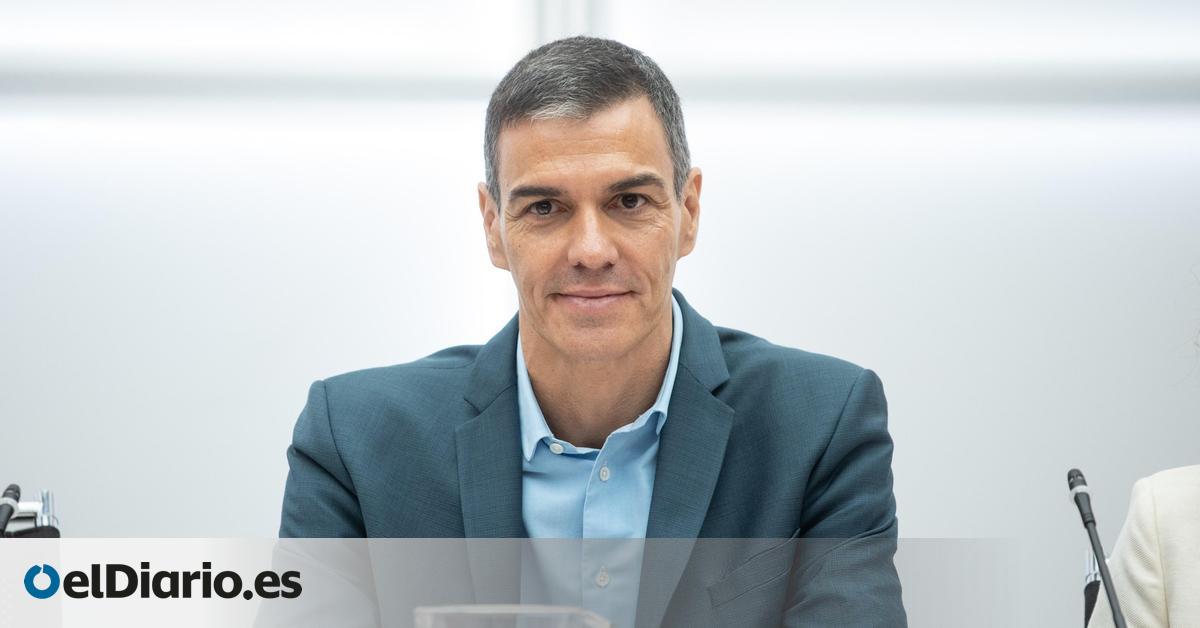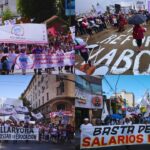
At the most delicate moment of his mandate, the president of the Government, Pedro Sánchez, faces on Wednesday his last appearance of the political course in the Congress of Deputies. Faced with a reinforced PP after the Congress that raised Alberto Núñez Feijóo over the weekend, the main challenge of the chief of the Executive is to try to convince its parliamentary partners of the need to exhaust the legislature despite the case of corruption that has disturbed internal and external life of both the government and the PSOE in recent weeks: the alleged involvement of what was one of the men of its maximum. Of socialist organization, Santos Cerdán, within a plot of public contracts and collection of bite for which the former minister José Luis Ábalos is also investigated and his closest collaborator for years, Koldo García, following his appearance in a report by the Civil Guard.
Sánchez tried to get airy last Saturday from the Federal Committee despite the state of ‘shock’ and internal concern that both cases have generated. He managed to stage a kind of closing of rows, since all the leaders present, with the sound exception of the Castilian President Manchego, Emiliano García-Page, supported their idea of continuing in front of both the PSOE and the Government. “The captain does not disregard when bad sea comes, it stays to fall temporary and save the ship,” he said, among his applause.
It is more difficult now to achieve similar support in Parliament with its partners, which you need to approve any vote, all publicly annoying with the cases that affect the socialists and incessantly claiming explanations and additional measures in terms of transparency and anti -corruption that do not arrive or do not satisfy them.
In the Government they are aware of the pressure they have exerted in recent days both add and the rest of the parliamentary partners and ensure that the president will take into account his requests in his appearance on Wednesday, especially those that have to do with cutting corruption “in all flanks and actors” involved. In the Executive, however, they believe that parliamentary partners also have a “responsibility.” “If a group wants a motion of censure, to explain it,” they launch.
While the Legislature advances to droppers, but with recent triumphs of the progressive block in Parliament, shortly after the Cerdán scandal itself, Sanchez himself maintained a round of meetings with those partners who, at least, guaranteed that they have no plan to support a motion of censure piloted by the PP of Alberto Núñez Feijóo, with the necessary concurrence of the right concurrence of the extreme right of the right. But little else. The add, which governs in coalition with the PSOE, but, above all, ERC, Junts, EH Bildu and PNV, wait and demand that Sánchez propitiate a turning point. Without specifying their requests, they all trust that the President of the Government present a package of legislative measures that on the one hand allow to cut any type of corruption and, in addition, promulgate a turn to the left of the executive action. We can, on the other hand, have directly broken relations with the Executive and end the legislature while talking about the PSOE as a “corrupt organization.”
The posture of the space of adding
Already on Monday, the General Coordinator of Sumar, Lara Hernández, warned the PSOE that it does not leave this crisis with “rhetoric”, “paralysis”, “immobility”, “empty ads” or “inaction”, and remarked that adding is not in the government “to resist, but to transform and advance.”
The minority partner of the Government sees it necessary to put on the table democratic regeneration measures and social agenda. And has hardened the tone in recent days. In fact, it will be vice president Yolanda Díaz, who makes the first intervention by the Plurinational Group, an unusual movement and that accounts for the importance of the coalition to this appearance. In the replica shift, adding will distribute among its territorial sensibilities after the last crises and will let the deputy of Compromís, Alberto Ibáñez, and that of Més Per Mallorca, Vicenç Vidal.
One of the measures with which the plurinational group has pressed is the creation of an anti -corruption office. Also on Monday, Summation transferred that they will carry “the remuneration of the parental permit” to the Council of Ministers this same July, as a way to continue pressing the PSOE, which promised to approve that remuneration in the pact that allowed the coalition.
IU, which is also part of the government, intends that Sanchez includes among its ads some of the 35 measures against corruption that they raised just a few weeks ago, in full burst of the Cerdán case. Antonio Maíllo’s team has requested, for example, a legal change for the corruptions to assume the “direct and indirect costs of their actions, damages to third parties, judicial costs and restitution of injured rights.” Or, for example, that these corrupt companies are prohibited from attending public contracting tenders if they have been convicted, both they and their managers, in the last ten years.
Gerardo Pisarello, a member of adding and spokesperson for the Communs in Congress, was more hard on Tuesday. As he said, if Sánchez does not react or shows the ability to lead the critical situation in which the legislature is found during his appearance, it can be “the prelude to a matter of trust.” He wants this intervention to “gather whether that trust exists or not” by its parliamentary partners and, given this dilemma, the commons claim their pressure to Sánchez and the PSOE “Audaacia”, “Valentía” and that they are “up to it” to launch a battery of anti -corruption measures and social progress.
“Everything that has to do with corruption does not help, on the contrary, it puts problems,” said the Vice -Secretary of Communication of ERC, Isaac Albert last week. The formation asks the PSOE to “clean” in its ranks “falls who fall” and also expects Sánchez, in his appearance, to announce anti -corruption measures and a left turn in his main policies as a guarantee for the survival legislature. Regarding the Federal Committee on Saturday, Albert said this week that neither ERC nor the Catalans “are interested in how Spanish socialism is organized internally, but what they claim is to know” how far the corruption comes and what will be done so that it does not happen again. ” They hope that all these questions are answered by Sánchez this Wednesday.
“It is not worth apologies”
The PNV leader, Aitor Esteban, said after the outbreak of the Santos Cerdán scandal that his group will give his “vision of the situation” and how he believes that “it is the political moment” during the plenary of this Wednesday. “We think that it is not worth some apologies. It will have to be delimited that the Cerdán-Aálos-Koldo triangle ends there and it would be convenient for a story to be made with meaning and based on what happens from the moment in which Ábalos from the Government departs,” he says. “Exemplarity, transparency and complying with the investiture pact. We are not going to ask for any plus or market with these serious facts,” he said, on the other hand, in recent weeks, the spokeswoman for Basque nationalists in Congress, Maribel Vaquero.
Another of the main partners of the government, EH Bildu, considers that “you cannot sustain” the executive “only with the argument of those who come are worse, who are quite worse and that they are not at all, say free of cases of corruption.” “Now we are attending shows that attract our attention. But, finally, what we say to this government is already just saying that the others are worse, it is not enough,” he also warned this week the leader of the Basque independence formation, Arnaldo Otegi. This will be his approach in Wednesday’s plenary: “What should be done is what was not done in 78. It is to launch a democratic, popular and plurinational project. Putting a really democratic scenario, a project that structures corruption structurally and a project that raises popular majorities in Euskal Herria, in Catalonia and in other villages of the state.”
Junts, the partner who was further from Moncloa’s thesis even before the case of Santos Cerdán broke out, believes that corruption “is a crisis of the Spanish political system” and arises, since Wednesday, “take advantage of the weaknesses of the State.” Jordi Turull has been holding in recent weeks that his interest “concentrates now in knowing if this crisis will impact on compliance with the investiture agreements.” At the meeting held by his spokesman in Congress, Miriam Nogueras, with Sánchez, in Moncloa, a couple of weeks ago, Junts asked the executive “guarantees” in those compliance, a request that will also highlight this Wednesday in Parliament.
Sanchez will also receive pressure from the mixed group with Canarian coalition. The president of the Islands, Fernando Clavijo, advanced Monday in an interview at the forefront that his training will ask the socialist leader to undergo a matter of trust. “The question is the following. Does the government have the necessary support to govern, approve a budget and face the main problems of citizenship? Today there is only one way to answer that question: a matter of trust,” he said.
The Government rules out a tool like this, which is an exclusive prerogative of the president, since he considers that he has not lost parliamentary support as shown by the laws that continue to be approved in Congress.
In addition to the challenges that have put his own partners, Sánchez faces a reinforced Feijóo on Wednesday, which was endorsed as leader of the PP in the congress of this weekend almost to the Bulgarian (with 99% of the support) and that maintains a double speech with respect to his pacts with Vox, his main ally in the institutions and, at the same time, his main electoral rival. The assumption of some of the most radical postulates of the extreme right by the Feijóo team and the recent proposal of the Santiago Abascal party to expel millions of migrants could be used by the chief of the Executive as the only way to offer a profile that can generate sympathies between those who support it, especially the leftist partners, at a very adverse moment.
Source: www.eldiario.es

